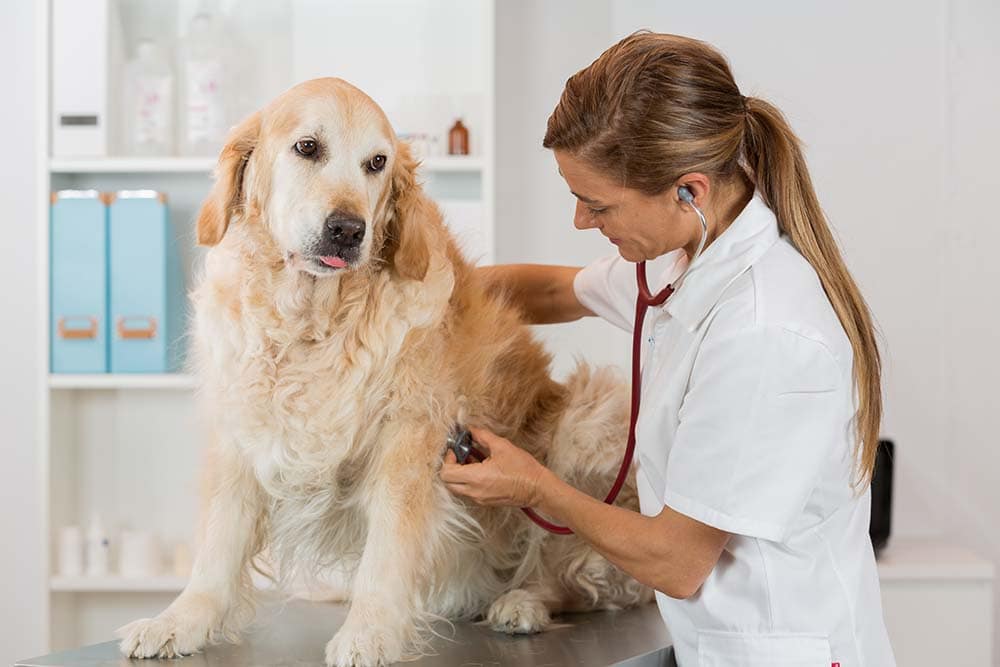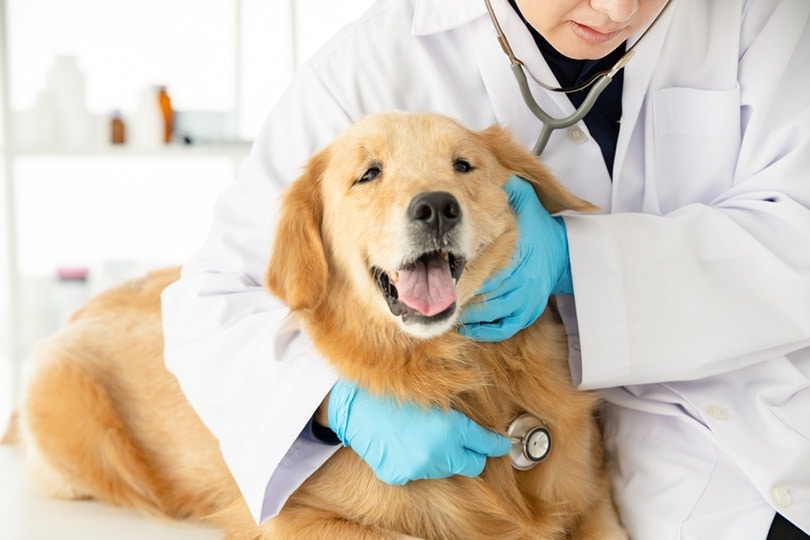Liver Disease in Dogs: Symptoms, Causes, and Treatment (Vet Answer)
By Dr. Sharon Butzke, DVM (Vet)
Updated on

The liver is a vital organ located in the abdomen, behind the diaphragm in dogs. It serves many critical functions for the body, some of which include:
- Making bile acids to help with digestion
- Metabolism of protein, carbohydrates, and fat
- Storage of vitamins, minerals, and important molecules (e.g., glycogen, triglycerides)
- Filtering the blood to remove unwanted substances (e.g., byproducts of digestion, medications, and toxins)
- Production of a variety of proteins, including albumin and blood clotting factors
Liver disease can be caused by many different things including (but not limited to) inherited abnormalities, infectious agents, toxin ingestion, and cancer.
 What are The Symptoms of Liver Disease in Dogs?
What are The Symptoms of Liver Disease in Dogs?
The liver has an amazing ability to compensate for damage and it can even regenerate! Signs of liver disease typically don’t become apparent until more than 70% of the organ’s functional ability has been lost.

- Decreased energy
- Loss of appetite
- Vomiting and/or diarrhea
- Increased drinking and urinating
- Low energy, weakness
- Refusal to eat
- Bloated appearance to the abdomen due to build-up of fluid (ascites)
- Jaundice (yellow tinge visible in the eyes, gums, and skin)
- Neurologic changes (i.e., hepatic encephalopathy)
What Causes Liver Disease in Dogs?
As previously mentioned, many different things can lead to liver disease. We have separated them into congenital (present at birth), acute (sudden onset) and chronic (long-term) hepatitis.
This list is, by no means, exhaustive, but it covers many of the common causes of liver disease in dogs.

1. Congenital Conditions
The term congenital describes any condition that is present at birth. Congenital conditions can be inherited (i.e., passed genetically from parent to offspring), or a chance occurrence (i.e., abnormal development in-utero).
- Portosystemic shunt
- Hepatic microvascular dysplasia (e.g., in Yorkshire and Cairn Terriers)
- Copper-associated liver disease (e.g., in Bedlington Terriers)
- Primary hyperlipidemia (e.g., hypertriglyceridemia in Miniature Schnauzers)
2. Acute Liver Disease

Acute liver disease comes on quickly. It can be the result of sudden damage to the liver, or an exacerbation of chronic liver disease.
- Certain medications (e.g., acetaminophen, carprofen)
- Toxin ingestion (e.g., xylitol, blue-green algae, sago palm, aflatoxins)
- Infectious (e.g., leptospirosis, canine adenovirus)
- Cancer (e.g., lymphoma)
3. Chronic Hepatitis (Inflammation of the Liver)
Many cases of chronic hepatitis are classified as idiopathic, meaning no specific cause is identified. However, it has been associated with some of the following factors:
- Certain medications (e.g., phenobarbital)
- Infections (not commonly; an example is the tick-borne disease, Ehrlichia canis)
- Immune-mediated disease (may be suspected when no other cause is identified)
How is Liver Disease Diagnosed in Dogs?
Your veterinarian may suspect liver disease if your dog has any of the clinical signs listed above. They will ask you questions to obtain a thorough history, perform a complete physical examination, and likely recommend blood and urine testing to start. Elevated liver enzymes on blood work will support their suspicion.
There are many additional tests that can be used to further characterize the type and severity of liver disease, which are discussed in detail here.

How is Liver Disease Treated in Dogs?
The exact treatment depends on the underlying cause of the liver disease.
Please do not attempt to manage liver disease on your own!
Veterinary support is critical to ensure the disease is addressed correctly and to monitor your dog’s response to treatment. Every patient is an individual, so it may take some time to determine the best therapeutic plan for your pup.
- Diet Modification: This is primarily indicated for dogs with copper-associated liver disease, or hepatic encephalopathy due to severely impaired liver function.
- Nutraceuticals: Nutritional supplements used for liver disease in dogs are primarily antioxidants to help the liver repair itself and minimize on-going damage. There is currently little clinical evidence that nutraceuticals can help dogs with liver disease live longer, but they may help your pup feel better and are unlikely to be harmful if used at the correct doses under veterinary supervision.

- S-adenosylmethionine (SAMe)
- Extracts from milk thistle (e.g., silybin)
- Vitamin E
It is important to note that nutraceuticals are generally not well-regulated. Veterinary supplements that have been studied specifically in dogs may be a better choice for pups with liver disease than over-the-counter products.
Specific Medications
Certain medications may be used in cases where a specific cause of liver disease is identified. Examples include antibiotics, anti-inflammatories, and immunosuppressants.

Supportive Care
It is important to manage symptoms that occur secondary to liver disease (e.g., nausea, stomach ulcers) in order to help your dog enjoy the best quality of life possible.
Can Dogs Recover From Liver Disease?
The liver is a highly regenerative organ with an amazing ability to repair itself. So, in some cases, the answer is yes. Leptospirosis and acetaminophen toxicity, for example, can have a favorable prognosis if they are identified and treated right away.
- Sago palm toxicity
- Blue-green algae toxicity
- Aflatoxin toxicity
- Chronic hepatitis and ascites
Your veterinarian will be able to provide more specific advice based on your dog’s condition and response to treatment.
 Conclusion
Conclusion
Liver disease can be caused by a variety of things and affects each dog differently. Prognosis depends on the exact cause of disease, but prompt diagnosis and treatment may offer a better chance for recovery.
- Vaccines are available to help prevent some of the infectious causes of liver disease in dogs (e.g., leptospirosis, canine adenovirus)
- Your veterinarian can recommend a parasite control program to reduce your dog’s risk of contracting a tick-borne illness
- Routine blood work may help identify liver changes early in the course of disease, allowing for earlier intervention
If you suspect your dog may have ingested something toxic, please seek veterinary attention immediately.
Featured Image Credit: PickPik

 What are The Symptoms of Liver Disease in Dogs?
What are The Symptoms of Liver Disease in Dogs?









